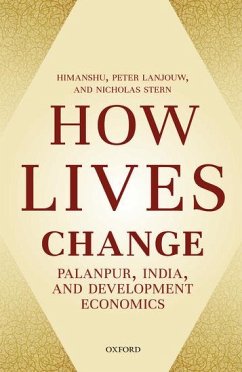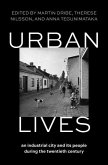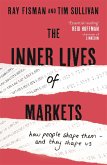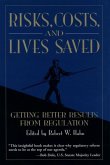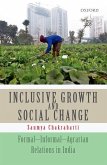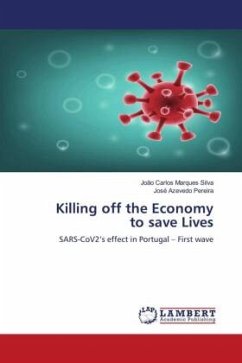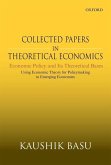- Gebundenes Buch
- Merkliste
- Auf die Merkliste
- Bewerten Bewerten
- Teilen
- Produkt teilen
- Produkterinnerung
- Produkterinnerung
Development economics is about understanding how and why lives change. This book assesses the performance and potential of development in a single village in a crucially important country. By studying Palanpur in India over seven decades it shows how the changes in one village can provide insight into changes in India since independence.
Andere Kunden interessierten sich auch für
![Urban Lives Urban Lives]() Urban Lives117,99 €
Urban Lives117,99 €![The Inner Lives of Markets The Inner Lives of Markets]() Ray FismanThe Inner Lives of Markets19,99 €
Ray FismanThe Inner Lives of Markets19,99 €![Unequal Family Lives Unequal Family Lives]() Unequal Family Lives123,99 €
Unequal Family Lives123,99 €![Risks, Costs, and Lives Saved Risks, Costs, and Lives Saved]() Robert W. Hahn (ed.)Risks, Costs, and Lives Saved78,99 €
Robert W. Hahn (ed.)Risks, Costs, and Lives Saved78,99 €![Inclusive Growth and Social Change Inclusive Growth and Social Change]() Saumya ChakrabartiInclusive Growth and Social Change67,99 €
Saumya ChakrabartiInclusive Growth and Social Change67,99 €![Killing off the Economy to save Lives Killing off the Economy to save Lives]() João Carlos Marques SilvaKilling off the Economy to save Lives29,99 €
João Carlos Marques SilvaKilling off the Economy to save Lives29,99 €![Collected Papers in Theoretical Economics: Economic Policy and Its Theoretical Bases Collected Papers in Theoretical Economics: Economic Policy and Its Theoretical Bases]() Kaushik BasuCollected Papers in Theoretical Economics: Economic Policy and Its Theoretical Bases47,99 €
Kaushik BasuCollected Papers in Theoretical Economics: Economic Policy and Its Theoretical Bases47,99 €-
-
-
Development economics is about understanding how and why lives change. This book assesses the performance and potential of development in a single village in a crucially important country. By studying Palanpur in India over seven decades it shows how the changes in one village can provide insight into changes in India since independence.
Produktdetails
- Produktdetails
- Verlag: Oxford University Press
- Seitenzahl: 528
- Erscheinungstermin: 22. Oktober 2018
- Englisch
- Abmessung: 236mm x 152mm x 33mm
- Gewicht: 885g
- ISBN-13: 9780198806509
- ISBN-10: 0198806507
- Artikelnr.: 52962611
- Herstellerkennzeichnung
- Libri GmbH
- Europaallee 1
- 36244 Bad Hersfeld
- gpsr@libri.de
- Verlag: Oxford University Press
- Seitenzahl: 528
- Erscheinungstermin: 22. Oktober 2018
- Englisch
- Abmessung: 236mm x 152mm x 33mm
- Gewicht: 885g
- ISBN-13: 9780198806509
- ISBN-10: 0198806507
- Artikelnr.: 52962611
- Herstellerkennzeichnung
- Libri GmbH
- Europaallee 1
- 36244 Bad Hersfeld
- gpsr@libri.de
Himanshu is Associate Professor of Economics at the Centre for Economic Studies and Planning at Jawaharlal Nehru University,and Visiting Fellow, Centre de Sciences Humaines, New Delhi, India. His areas of research include issues related to poverty, inequality, employment, food security, and agrarian change. He has been involved with various government committees including the Expert Group on Measurement of Poverty (Tendulkar Committee), National Statistical Commission, and the Ministry of Rural Development. He has received the Sanjay Thakur Young Economist Award of the Indian Society of Labour Economics and Personnalité d'Avenir of the French Ministry of Foreign Affairs. Himanshu received his PhD in economics from JNU, New Delhi, India. Peter Lanjouw is a Professor of Development Economics at VU University, Amsterdam. Prior to joining VU University he spent more than two decades in the Development Economics Research Group of the World Bank, most recently as Manager of the Poverty and Inequality team. He is current editor of the World Bank Research Observer and a past assistant editor of the World Bank Economic Review. He is a fellow of the Tinbergen Institute and the European Development Research Network, and was a core member of the Global Poverty Commission. His principal research interests include the measurement and analysis of poverty and inequality in developing countries, structural transformation in developing countries, structural transformation in developing countries and the contribution of longitudinal village studies to the analysis of rural development. Nicholas Stern is the IG Patel Professor of Economics and Government, Chairman of the Grantham Research Institute on Climate Change and the Environment and Head of the India Observatory at the London School of Economics. He was previously President of the British Academy, and is President of the Royal Economic Society 2018/19. He was Chief Economist of the European Bank for Reconstruction and Development, 1994-1999, and Chief Economist and Senior Vice President at the World Bank, 2000-2003. He was Head of the Stern Review on the Economics of Climate Change (2006); and Head of the Government Economic Service from 2003-2007. Lord Professor Stern was knighted for services to economics in 2004, made a cross-bench life peer as Baron Stern of Brentford in 2007, and appointed Companion of Honour for services to economics, international relations and tackling climate change in 2017. He has published more than 15 books and 100 articles.
Part I: Foundations
1: The Study of Villages and the Understanding of Development: Building the Evidence
2: Palanpur: The Village through Seven Decades
3: India and Palanpur: A Story of Change
4: Theory and India
Part II: Economy
5: Changing Activities, Changing Markets: Agriculture
6: Tenancy in Palanpur
7: Changing Activities, Changing Markets: Beyond Agriculture
8: Poverty, Inequality, and Mobility in Palanpur
Part III: Society
9: Human Development: Education, Health, Public Services
10: Women: Possibilities and Constraints
11: Society and Politics: Inertia and Change
Part IV: Reflections
12: Future Prospects
13: Lessons for India, Policy, and the Economics of Development
1: The Study of Villages and the Understanding of Development: Building the Evidence
2: Palanpur: The Village through Seven Decades
3: India and Palanpur: A Story of Change
4: Theory and India
Part II: Economy
5: Changing Activities, Changing Markets: Agriculture
6: Tenancy in Palanpur
7: Changing Activities, Changing Markets: Beyond Agriculture
8: Poverty, Inequality, and Mobility in Palanpur
Part III: Society
9: Human Development: Education, Health, Public Services
10: Women: Possibilities and Constraints
11: Society and Politics: Inertia and Change
Part IV: Reflections
12: Future Prospects
13: Lessons for India, Policy, and the Economics of Development
Part I: Foundations
1: The Study of Villages and the Understanding of Development: Building the Evidence
2: Palanpur: The Village through Seven Decades
3: India and Palanpur: A Story of Change
4: Theory and India
Part II: Economy
5: Changing Activities, Changing Markets: Agriculture
6: Tenancy in Palanpur
7: Changing Activities, Changing Markets: Beyond Agriculture
8: Poverty, Inequality, and Mobility in Palanpur
Part III: Society
9: Human Development: Education, Health, Public Services
10: Women: Possibilities and Constraints
11: Society and Politics: Inertia and Change
Part IV: Reflections
12: Future Prospects
13: Lessons for India, Policy, and the Economics of Development
1: The Study of Villages and the Understanding of Development: Building the Evidence
2: Palanpur: The Village through Seven Decades
3: India and Palanpur: A Story of Change
4: Theory and India
Part II: Economy
5: Changing Activities, Changing Markets: Agriculture
6: Tenancy in Palanpur
7: Changing Activities, Changing Markets: Beyond Agriculture
8: Poverty, Inequality, and Mobility in Palanpur
Part III: Society
9: Human Development: Education, Health, Public Services
10: Women: Possibilities and Constraints
11: Society and Politics: Inertia and Change
Part IV: Reflections
12: Future Prospects
13: Lessons for India, Policy, and the Economics of Development

